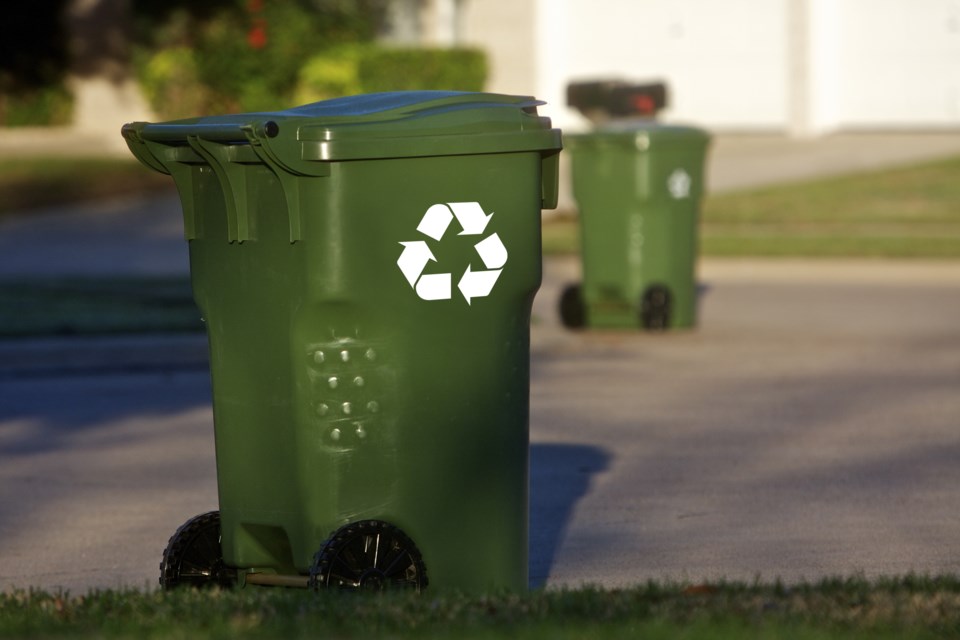THUNDER BAY – The City of Thunder Bay is moving ahead with plans for a curbside green bin program, set to launch in 2025.
The program has the potential to divert huge amounts of material away from landfill, with food and other organics making up roughly half of what’s currently thrown in the trash.
The program will help the city meet new provincial requirements to divert 50 per cent of its residential organic waste from landfill by 2025.
To reach the target, the city will add weekly green bin pickup, scale back garbage collection to every second week, and double the number of yard waste collection days to four per year.
It will also introduce an auto-cart system for garbage and organics, using standardized bins that will be picked up using automated “lift assist” arms, a move expected to trim costs and reduce physical strain on waste collection workers.
City council approved the plan in a unanimous vote on Monday, after hearing a first report earlier in June.
Green bin service will start for single-family homes by 2025, with apartments and other multi-unit buildings added the next year. The city hasn't yet committed to provide the service for businesses.
City councillors have expressed some trepidation over how the transition will be received in the community, seeking reassurances that cutting the frequency of garbage pickup won't create problems.
“This is a major behavioural change for citizens, so I’m just wondering about the communications strategy,” Coun. Brian Hamilton inquired during discussion of the plan on Monday.
Promotion and education will be key to the program’s success, said Jason Sherband, manager of solid waste and recycling, but he expressed confidence residents will receive a similar level of service, just delivered differently.
“We know from curbside waste audits we’ve done... that 50 per cent of the waste that’s being put out at the curb is food and organic waste,” he told council. “We’re not actually taking anything away, we’re just now redirecting that material into a different container than your regular garbage.”
In an interview, Sherband said he hadn’t heard any concerns from the community over the plan – quite the opposite, he said.
“I actually view this as pretty exciting. For a lot of people I’ve talked to over the years, this is something they’ve wanted and been asking for.”
An analysis found the city can’t meet the province’s waste diversion target without cutting garbage pickup, he noted.
“The big thing to realize is that not only do we have to implement the program, but we do have to hit a 50 per cent diversion target. The only way to achieve that target is to move to every other week garbage collection.”
Cities that scale back garbage collection capture far more organic material, city staff concluded in a report. Sudbury, for example, saw an immediate 16 per cent jump in green bin participation after making garbage collection biweekly.
Sherband also pointed to the plan’s environmental benefits.
The program is projected to cut local greenhouse gas emissions by the equivalent of 5,380 tons of CO2 a year – around 5.7 per cent of Thunder Bay's waste-related GHG emissions, or 0.4 per cent of its total emissions.
The changes will also bring new costs, estimated at $1.5 million per year on average. However, staff project the city can make up over $800,000 of that through efficiencies from auto-cart trucks, which will require just one employee to operate instead of two.
The change would allow the city to reduce staffing by 5.3 FTEs in the waste collection department, a report found.
The city will now launch a Request for Proposals for an aerobic processing solution for organic waste.
“We know how we’re going to collect it, but we have to have somewhere to process it,” said Sherband. “That’s number one on our to-do list now that council has approved our recommendations.”
The city examined the possibility of an anaerobic digester at the Mapleward landfill, but found it would not be cost-effective.
Administration will present a detailed implementation plan, including program costs and design parameters, by January 2023.
